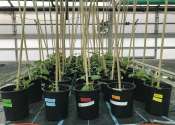Garlic mustard populations likely to decline
Invasive plants are often characterized as highly aggressive, possessing the power to alter and even irreversibly change the ecosystems they invade. But a recent University of Illinois study shows that one such invader, garlic ...








